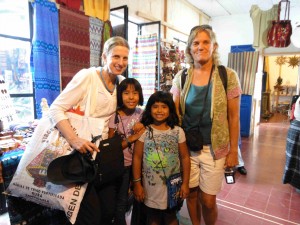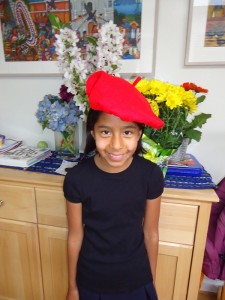 This morning, my daughter Olivia ate her cereal clad in black leggings and a t-shirt, wearing a red beret. Snapping her fingers, she spurted the phrases “Oh yeah. Dig it. Groovy.” After a long pause, she uttered a single syllable: “Wow.”
This morning, my daughter Olivia ate her cereal clad in black leggings and a t-shirt, wearing a red beret. Snapping her fingers, she spurted the phrases “Oh yeah. Dig it. Groovy.” After a long pause, she uttered a single syllable: “Wow.”
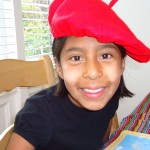
To anyone who has spent a nanosecond on a college campus or in a bookstore, or even watching TV, Olivia’s behavior can indicate only one thing: Poetry Reading.

An hour later, to the strains of Dave Brubeck’s Take Five, I and other parents of third graders streamed into the appropriately dimmed Multipurpose Room of Olivia’s school for the first annual “Writing Cafe.” One kept turning to look over one’s shoulder, expecting Jack Kerouac, Allen Ginsberg, or some other bearded “Beat” to walk in. At least a loose-limbed free spirit in bare feet and a leotard improvising a “Dance to Spring.” Instead, we were treated to our own childen, who did their best to maintain an atmosphere of hushed coolness. The performers didn’t rush up to the microphone to read their stanzas and haiku. They sauntered.
As I listened, nodding my head in a way that would make any former English major proud, a powerful memory overtook me: I was in fifth or sixth grade, and the class had just received the latest issue of Scholastic magazine. (In those days, before Internet and laptops, IPads and Kindles, Scholastic magazine represented one of our few diversions from the serious tasks of grammar drills and sentence diagramming. We eagerly anticipated its arrival.) And in this particular issue was a poem by Haki Madhubuti, then known as Don Lee. The title was “But He Was Cool, or: he even stopped for green lights.” To give you an example of the language, I’ll quote my favorite line: “cool cool so cool him nick-named refrigerator.”
Talk about the world as you knew it turning upside down! After a reading repertoire limited to “Mother Goose,” “The Owl and the Pussycat,” and The Happy Hollisters series, I was electro-shocked by Madhubuti’s poem. This morning, sitting in Olivia’s “Writing Cafe,” I wondered if any of the children on stage experienced the same jolt from reading words that I once did. I hoped so.
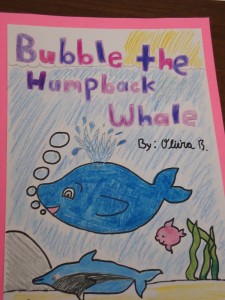
After the show, the parents and students retreated to the classrooms, where the kids presented their work from the past quarter. Olivia proudly showed me her illustrated short story, “Bubble the Humpback Whale.” Artist that she is, Olivia continued to edit: Unhappy with one unfinished corner of the story cover’s background, she grabbed her yellow pencil to fix it.
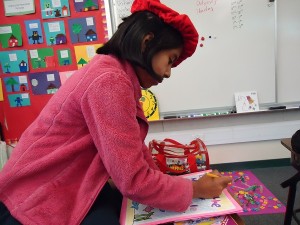
As I watched my little girl, I realized That’s the life of the artist. Never satisfied.
You dig? Oh yeah.
PS: In 2007, I recorded a short piece for KQED-FM radio called An Artist’s Life, about the struggles of a life dedicated to art. If you have time, please give it a listen.


 ShareThis
ShareThis



 ShareThis
ShareThis